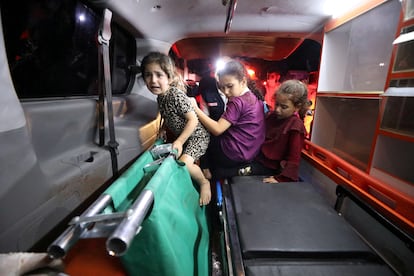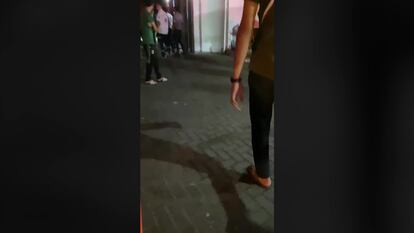The deadliest night in Gaza: ‘It was much scarier than hell’
Hundreds of civilians were sheltering at the al-Ahli Hospital when it was hit by an explosion that both sides are blaming on one another. A witness to the massacre explains what he saw

“Last night I witnessed something unimaginable, horrible… I have no words to describe it,” says Saeb Alzard, 27. “It was much scarier than hell. I never imagined I would see all that, the dead, the wounded…,” he describes over the phone. He is talking about the attack on Tuesday night against the al-Ahli al Arab Hospital in Gaza, where 471 people died, according to the Gaza Strip’s health authorities. Alzard was caring for his injured mother at Shifa hospital when the blast took place at the city’s other medical center, located about two miles from where he was.
Alzard supports his story of horror in the video he recorded after he arrived at the scene. In disbelief, he narrates loudly in English and Arabic the scenes he finds in the midst of the chaos, the flames, the emergency services, the ambulances, the health workers trying to bring some order and the trail of corpses everywhere. “Please pray for us!”, “I can’t believe what is happening!”, “Look, this is a child... without a head!”, he is heard saying behind the screen of his cellphone.
With this attack, the combined death toll between both sides is already more than 4,700, mostly civilians, since the crisis broke out on October 7. That day, Hamas attacked Israeli territory in an unprecedented raid by land, sea and air. The response came immediately in the form of unrelenting airstrikes by Israel, which is preventing the press from accessing a territory that it keeps sealed off. Those killed in the hospital included hundreds of people seeking refuge in a place they considered safe. This is the deadliest attack that has occurred so far in the current escalation of violence. Although Hamas blames Israel for the attack, the government of Benjamin Netanyahu attributes the impact of the projectile to an errant rocket launched by the Islamic Jihad.
Surrounded by dozens of corpses, some of children, Dr. Ghassan Abu Sitta, a British-Palestinian doctor, appeared at the doors of the hospital. He said that he had arrived that Tuesday morning from the Shifa hospital due to the overload of patients at al-Ahli al Arab Hospital. After performing surgeries all day, he decided to spend the night there. The explosion, according to his testimony, caused the ceiling of the operating rooms to cave in. When he stepped outside, he came across dozens of bodies piled up, “some of dead children, others still moving.” There were also amputees and human remains scattered all over the place, said Abu Sitta, who introduced himself as a worker for Doctors Without Borders (MSF), although this humanitarian organization told EL PAÍS that, at this time, it does not have any “active projects in Gaza,” so that he was acting on his own behalf.

That hospital, according to the United Nations, was one of 20 in northern Gaza that Israel had given the order to evacuate, but “it has been impossible given the current insecurity, the critical condition of many patients and the lack of ambulances, personnel, bed capacity and alternative shelters for the displaced,” according to sources from the World Health Organization (WHO). Before the explosion in the al-Ahli al Arab Hospital, that agency had already documented 57 attacks against health centers in Gaza, with damage to 26 hospitals and other infrastructure and a total of 16 dead workers.
Furthermore, a major humanitarian crisis now looms for the more than two million inhabitants of this territory. On Wednesday, the Israeli government agreed to allow aid (food, water and medicine) to enter in a limited and controlled manner through the southern border of the strip from Egypt, at the request of the United States, whose president, Joe Biden, visited Tel Aviv on Wednesday.
The bombing of the health center signals a new twist in the escalation that has taken place since October 7. Both parties are trying to prove that it was the other side. The president of the United States, Joe Biden, attributed the explosion to a “failed rocket from a terrorist group,” according to “data” from his own Department of Defense. The Israeli army also accuses Palestinian armed groups of using the local population as human shields and of carrying out military activities around residential buildings and hospitals.
Meanwhile, popular outrage is growing, especially in the Arab world. The Episcopal Diocese of Jerusalem, which brings together Christian churches and is the owner of the attacked hospital, issued a statement in which it did not point fingers at anyone but did talk about the “brutal attack on our al-Ahli Anglican Episcopal Church hospital in Gaza during the Israeli airstrikes there.”
Gaza is on the brink of collapse due to a lack of water, food, electricity, fuel and medicine. “The situation in Gaza is getting out of control. Every second we wait to receive medical help, lives are lost,” denounced the director general of the WHO, Tedros Adhanom Ghebreyesus. The World Health Organization (WHO) estimates that two-thirds of primary care centers in the Gaza Strip remain closed.
Saeb Alzard’s father was seriously injured in one of the airstrikes on October 13, and died after three days in the intensive care unit (ICU). The family home, located in an apartment block in Gaza City, was destroyed. His mother’s leg was injured, but not seriously, says Alzard, but she still needs hospital care. He says that since the attack he has had hearing problems. “It is a miracle that only my father died. They are bombing every minute.”
The family now lives in an uncle’s house, but they refuse to flee towards southern Gaza. “No, no, no…” he responds bluntly. “I don’t think that’s the solution. We cannot. We have nothing and nobody [in southern Gaza]. Furthermore, [the Israelis] have no right to kick us out of our house. They have no right to make us emigrants again. We want to stay here and be united. Even under the bombs I think we are going to stay,” says a defiant Alzar, who studied engineering in Turkey, where he lived between 2015 and 2022, returned to Gaza and now makes a living teaching English and Turkish in a private center.
Daily life, he adds, depends not only on avoiding the constant bombs, but also on accessing basic supplies. He says that they do not have running water — “that is the worst part and our great challenge” — and that they have only one hour of light a day. “We are just surviving,” he concludes. With about 5,500 inhabitants per square kilometer, Gaza has one of the highest population densities in the world. Of its 2.2 million inhabitants, two thirds have refugee status.
Sign up for our weekly newsletter to get more English-language news coverage from EL PAÍS USA Edition
Tu suscripción se está usando en otro dispositivo
¿Quieres añadir otro usuario a tu suscripción?
Si continúas leyendo en este dispositivo, no se podrá leer en el otro.
FlechaTu suscripción se está usando en otro dispositivo y solo puedes acceder a EL PAÍS desde un dispositivo a la vez.
Si quieres compartir tu cuenta, cambia tu suscripción a la modalidad Premium, así podrás añadir otro usuario. Cada uno accederá con su propia cuenta de email, lo que os permitirá personalizar vuestra experiencia en EL PAÍS.
¿Tienes una suscripción de empresa? Accede aquí para contratar más cuentas.
En el caso de no saber quién está usando tu cuenta, te recomendamos cambiar tu contraseña aquí.
Si decides continuar compartiendo tu cuenta, este mensaje se mostrará en tu dispositivo y en el de la otra persona que está usando tu cuenta de forma indefinida, afectando a tu experiencia de lectura. Puedes consultar aquí los términos y condiciones de la suscripción digital.









































